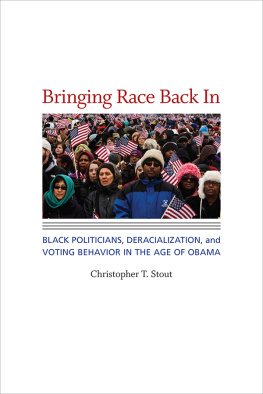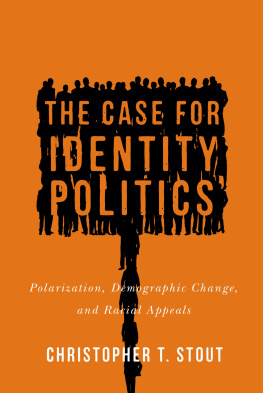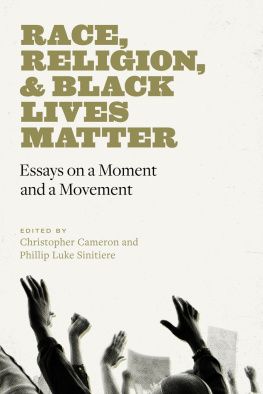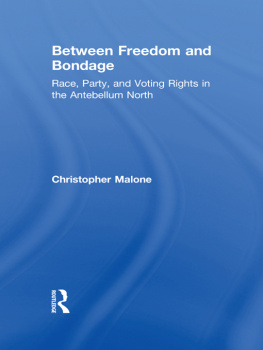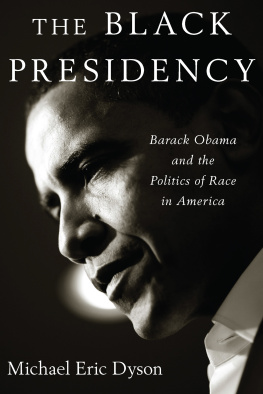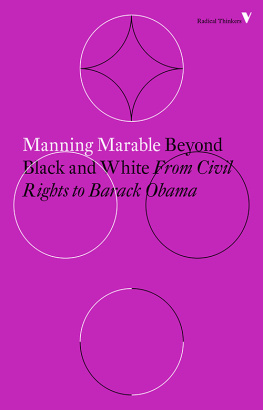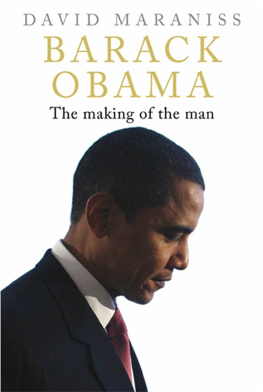University of Virginia Press
2015 by the Rector and Visitors of the University of Virginia
All rights reserved
Printed in the United States of America on acid-free paper
First published 2015
9 8 7 6 5 4 3 2 1
Library of Congress Cataloging-in-Publication Data
Stout, Christopher T., 1982
Bringing race back in : Black politicians, deracialization, and voting behavior in the age of Obama / Christopher T. Stout.
pages cm
Includes bibliographical references and index.
ISBN 978-0-8139-3668-0 (cloth : acid-free paper) ISBN 978-0-8139-3669-7 (e-book)
1. African AmericansPolitics and government21st century. 2. African American politicians. 3. Political candidatesUnited States. 4. RacePolitical aspectsUnited States. 5. VotingUnited States. 6. Political participationUnites States. 7. United StatesRace relationsPolitical aspects. 8. United StatesPolitics and government2009 I. Title.
E185.615.S758 2014
323.1196073dc23
2014020593
RACE, ETHNICITY, AND POLITICS
Luis Ricardo Fraga and Paula D. McClain, Editors
Acknowledgments
While this book project may appear in some ways to be a solo venture, it is really the product of a collective effort. As such, this book would not have been possible without the hard work and support of my advisors, colleagues, and friends.
The idea and plan for this book is born out of the guidance that I received from the faculty at the University of California, Irvine. In particular, I would like to thank Katherine Tate not only for helping me develop and explore the research questions in this book but also for all of her support and advice throughout the process. I would also like to thank Louis DeSipio, whose devotion to the education and success of his students is truly inspirational. Louis played an invaluable role in helping me refine and shape the theory in this book. I would also like to thank Carole Uhlaner and Bernie Grofman, who were instrumental in the development and design of this research project.
I would like to express gratitude for the comments and conversations about the book from all of my colleagues at University of California, Irvine, Wellesley College, and Southern Illinois University, Carbondale, friends, and other scholars including Steven Boutcher, Steve Bloom, Randy Burnside, Tom Burke, Kris Coulter, Randy Davis, Jennifer Garcia, Stacie Goddard, Tobin Grant, Laura Grattan, Benjamin Lind, Danvy Le, Phillip Habel, John Hamman, Hahrie Han, Laura Hatcher, Dante Jackson, David Jackson, Nick Jackson, Marion Just, Reuben Kline, Gregory Leslie, Natalie Masuoka, Mara Marks, Scott McClurg, Peter Miller, Kathy Rim, Nancy Scherer, Kim Shella, Fred Solt and Grace Stout. My colleagues and friends provided me with both the support and critical insights necessary to advance the work presented in this book.
I also am eternally grateful for the research assistance of Megan Garratt-Reed, Shane Gleason, Maja Wright-Phillips, and Srobana Bhattacharya. These scholars were vital in helping me collect and analyze data, and their comments and suggestions influenced the structure of the book. Their involvement with the project helped me produce a much better text. I am particularly appreciative of the help that Megan Garratt-Reed provided in the early stages. Without her assistance with content coding, I would not have been able to complete this project.
The editors and staff at the University of Virginia Press have been incredible throughout this process. For that reason, I would like to thank the University of Virginia Press editors for the series on race and ethnicity in urban politics, Paula McClain and Luis Fraga. I would also like to express my gratitude to Dick Holway, who was always willing to counsel me and provide advice not only on the process of writing a book but also on ways to improve its content. The Press editors and staff have made this experience easier and much more pleasurable than I had expected.
I was also fortunate to find Paula Maute at Word Wise editing. Her initial copyediting was extremely important in clarifying the messages presented in this book.
I would also like to thank Martin Johnson. Without his guidance when I was an undergraduate at the University of California, Riverside, I would not have been in the position to write this book. His dedication to mentoring undergraduates is something that I try to emulate every day. I am also greatful for Paula McClain and the Ralph Bunche Summer Institute, which prepared me well for graduate school and introduced me to many of the topics that are covered in this book.
My wife, Kelsy Kretschmer, deserves special recognition for her help. My work and my life have become infinitely better since the beginning of our relationship. This project would still be in its nascent stages without her counsel and support. Kelsy assisted me in developing the theory for this project and coached me through every mini-crisis that I encountered. I am forever in her debt for all of her love and guidance.
Finally, I am deeply appreciative of my parents, Timothy and Theresa Stout, and my sister, Vanessa Stout. The political discussions in my household were the impetus for my interest in politics. In addition to inspiring my passion for political science, they provided me with all the resources necessary for success, including always being willing to discuss some of the more mundane aspects of this book. My familys love and support were invaluable in my work. For this reason, this book is dedicated to them.
Introduction
In a February 2012 interview with Ebony magazine, African American actor Samuel L. Jackson proffered a theory on black political behavior: I voted for Barack because he was black [and] thats why other folks vote for other people, because they look like them.... Thats American politics, pure and simple. [Obamas] message didnt mean [anything] to me. While the comment was impetuous, the essence of the statement rings true for many political pundits and politicians: black voters are much more likely to support a black candidate than a white candidate, regardless of the candidates message or political affiliation.
Historically, the assumption that black voters will unanimously support black candidates has been reflected in exit polls and election results. The mechanism that explained this relationship was also clear, as black voters and candidates shared similar policy objectives. Moreover, black candidates have traditionally devoted a significant amount of effort and resources appealing to black voters. For example, 1972 presidential candidate Shirley Chisholm embraced the black community in her campaign. In a speech she noted that she was black and proud. In cities like Chicago and Memphis, black mayoral candidates appealed to blacks using slogans like Its our turn and Our time has come. Congressional representatives from Adam Clayton Powell (D-NY, 194571) to Maxine Waters (D-CA, 1991present) routinely advocated for a progressive racial agenda and chastised the government for not doing enough to alleviate the economic and social plight of black Americans.
Today, in many ways, black voters and black candidates no longer share the same connection. While the majority of black voters still prefer racial policies such as affirmative action, more black candidates are ignoring or even opposing race-based legislation. first-term U.S. senator from Illinois, announced his presidential candidacy, but in contrast with Jacksons announcement, he did not explicitly mention race. While Jackson focused on empowering and mobilizing blacks, Obamas speech focused on bipartisanship and ending the wars in Iraq and Afghanistan.

